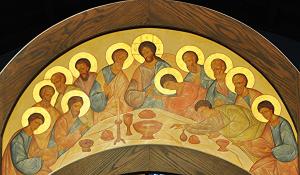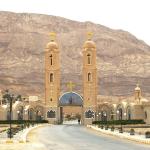
When Jesus celebrated the Mystical Supper (the Last Supper), those with him did not understand all that was going on. This should not be surprising, because, despite their close proximity to him, they consistently showed their inability to understand all that he said and did. This is why it was only in hindsight, after Jesus’ death and resurrection, were they able to reflect upon it and realize its significance. They probably understood Jesus was connecting himself and what he was doing with Passover, but they would have been unable to appreciate the connection. That he said that they would later repeat what he did in memory of him probably would have led them to realize Jesus was trying to make something special with the event because they understood religious remembrance as being more than mere recollection of the past, but an encounter and experience of power of the event which is remembered:
Rather, “remembrance” is a genuine, creative power, existing in the world, and our co-remembrance is an entry into that power – a real, ontological communion with it. Plato also discusses the anamnesis on the ideas, the heavenly prototypes of being that the soul beholds before it descends to earth, but this notion of prototype remains at the level of abstract universality. Here, however, the power of anamnesis relates to a concrete event that occurred not in an abstract heaven, some other concrete reality, but in the world, alive in all of life’s fullness.[1]
Jesus gave himself over to those who were with him at that supper, giving them more than just some physical bread; he gave them the heavenly bread, the bread of life. What they ate was more than his physical body and blood, but the fullness his own being, which is why it can be said to be the bread of heaven. We, in our liturgical repetition of the event of the Mystical Supper likewise are able to receive what they received, that is, Christ himself, and in doing so, we partake of grace after grace thanks to the eucharistic gifts given to us by Christ.
When reflecting upon the event, when reliving it and re-experiencing it for ourselves, we must remember many things were connected to it, each of which might be a part of our own experience. This is why Paul made sure we kept in mind that the Mystical Supper happened on the night on which Jesus was betrayed:
For I received from the Lord what I also delivered to you, that the Lord Jesus on the night when he was betrayed took bread, and when he had given thanks, he broke it, and said, “This is my body which is for you. Do this in remembrance of me.” In the same way also the cup, after supper, saying, “This cup is the new covenant in my blood. Do this, as often as you drink it, in remembrance of me.” For as often as you eat this bread and drink the cup, you proclaim the Lord’s death until he comes (1 Cor. 11:23-26 RSV).
The Last Supper was an event in history. What we read in the Gospels was not some story created for the sake of a new mystery religion. If we pay attention, it is clear that Paul, despite the way some approach him, did not ignore or forget the historical Christ. His thought always presupposes the historical background from which his theological insights emerge. While he would sometimes include historical reflections in his theological reflections, such as we find here, he mostly takes it all for granted. Paul did not think he had to repeat what the faithful already knew and accepted; rather he discussed those points which were needed to deal with the controversies of his time, those elements which were necessary to make and then develop his theological points. And so, just as Paul found it important to connect the Christian celebration of the eucharist to a particular event, we should likewise remember in all our celebrations that the Last Supper was a real event, one which was intimately connected to Christ’s passion (which, of course, the Gospels indicate).
Jesus knew what Judas had done, and that after the supper, Judas was going to lead the authorities to him. Jesus accepted what was about to happen as a continuation of and fulfillment of the kenotic love which led him, as the Word of God, to join with creation in the incarnation. He did not desire what was to come, but he accepted it; he let his creation seize him and use him as an object of scorn and hate so that through its actions, sin could come to its rightful conclusion and be overcome by his love. Thus, while we logically distinguish everything which happened, in reality, the betrayal, the celebration of the Last Supper, the capture, torture, execution, and ascension of Jesus were interconnected and formed one metaphysical event. It is this event, and not just parts of it, which we experience when we remember Christ in the eucharist. It is a metaphysical event which continues to penetrate into time, and all that happened in that event, embraces the time in which it is remembered, allowing all elements of the event itself to have their place in our remembrance of it. In this way, Jesus continues to give himself over to us and the world even as Jesus continues to be betrayed by many of those who claim to love and embrace him. It was also on this night that Peter said he would follow Jesus to the very end, and yet also turned and ran away, hiding his association from Jesus so as not to be taken in by secular authorities. This shows us that it is not just the betrayal we see in Judas, but also the infidelity of us all, which can be and should be seen enacted in the event, Likewise, through the event, we are shown that Jesus still accepts and welcomes us to his mystical banquet even though he knows what we might do. For he is willing to forgive us because of his great love for us, a love which is greater than our sin (which is why Peter was easily welcomed back, and if he did not despair, Judas could have been as well).
The Mystical Supper, the Last Supper, was an event like the Passover, an event which is to be commemorated in such a way we not only recollect what happened, but we re-experience it, showing that key events in time contain within them a transcendence which allows the event to be experienced time and time again. It is always the same event which is remembered, and so participated in each and every time it is remembered; this is not to say our experience of the event, our way of participation, is the same as it was in its historical reality. Obviously, it is not. Rather, each and every time, it will offer us something different, something which if we embrace, can make us greater, so that the more we participate in that metaphysical event, the more we will be transformed by it, finding ourselves growing in stature thanks to the graces given to us from the bread of life.
[1] Sergius Bulgakov, The Eucharistic Sacrifice. Trans. Mark Roosien (Notre Dame, IN: University of Notre Dame Press, 2021), 12.
Stay in touch! Like A Little Bit of Nothing on Facebook.
If you liked what you read, please consider sharing it with your friends and family!












